| Srl | Item |
| 1 |
ID:
077262


|
|
|
| 2 |
ID:
149823
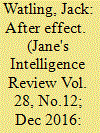

|
|
|
|
|
| Summary/Abstract |
Allied forces have begun the offensive to retake the northern Iraqai city of Mosul from the Islamic State. Reporting from Iraq, Jack Watling analyses how the successful recapture of the city will effect broader political and sectarian dynamics in the country.
|
|
|
|
|
|
|
|
|
|
|
|
|
|
|
|
| 3 |
ID:
132995
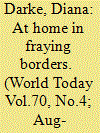

|
|
|
|
|
| Publication |
2014.
|
| Summary/Abstract |
One glance at a modern map is enough to understand why Nusaybin is a hotspot in today's world. Lying in southeast Turkey, it looks across the border at its southerly reflection, Qamishi is northeast Syria ; its main east west highway hosts an endless convey of tankers with their precious cargo heading out from Erbil in oil-rich Iraqi Kurdistan into oil poor Turkey
|
|
|
|
|
|
|
|
|
|
|
|
|
|
|
|
| 4 |
ID:
129426
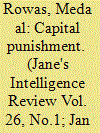

|
|
|
| 5 |
ID:
061703
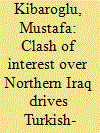

|
|
|
|
|
| Publication |
Spring 2005.
|
| Summary/Abstract |
Turkey and Israel enjoyed an almost perfect relationship throughout the 1990s that amazed their friends, yet bothered their rivals. The US war in Iraq revealed, however, that the two longstanding allies did indeed have contradictory objectives and concerns with respect to the future restructuring of Iraq. While Turkey fears the emergence of an independent Kurdish state in northern Iraq, the same possibility seems favorable for Israel from its security standpoint, vis-à-vis threats posed by countries like Iran, Pakistan, and beyond. It appears that the “amazing alliance” is heading toward a crossroads. Such an eventuality may change the nature of the relationship from a “win-win” to a “lose-lose” situation unless proper steps are rapidly taken with a view toward rebuilding confidence on both sides.
|
|
|
|
|
|
|
|
|
|
|
|
|
|
|
|
| 6 |
ID:
105584
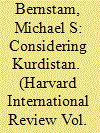

|
|
|
| 7 |
ID:
153868
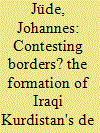

|
|
|
|
|
| Summary/Abstract |
The Kurds are the largest territorially concentrated ethnic group in the world without its own nation state. However, the Iraqi Kurdish population has been striving to establish its own political order for more than two decades and, in northern Iraq, a markedly developed de facto state has emerged. Iraqi Kurdistan has established a considerable degree of autonomy and domestic sovereignty, which is particularly impressive considering the current state of its parent state Iraq. This success is puzzling, when considered alongside the most prominent theory of state formation, which argues that it is war that makes states. War does not explain the Kurdish state-making process. Rather, it has been a major setback for the Iraqi Kurds after 1991. This suggests an alternative theory of state formation, which argues that social coalitions of key elites can account for successful state-building. This article argues that the social coalition of the Kurdistan Democratic Party (KDP) and Patriotic Union of Kurdistan (PUK), which sustained state-building in northern Iraq, emerged and stabilized because of external incentives. Demonstrating unity in front of the international community, and particularly in front of Iraqi Kurdistan's main sponsors, the US and Turkey, has resulted in large flows of revenue for the two parties. The case of Iraqi Kurdistan, therefore, allows for conclusions both on the potential and on the limitations of externally-promoted state-building coalitions. These insights are also relevant for debates on international state-building.
|
|
|
|
|
|
|
|
|
|
|
|
|
|
|
|
| 8 |
ID:
060944
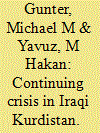

|
|
|
| 9 |
ID:
129254
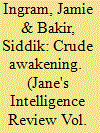

|
|
|
| 10 |
ID:
082007
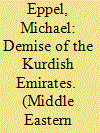

|
|
|
| 11 |
ID:
142062
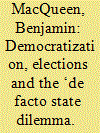

|
|
|
|
|
| Summary/Abstract |
De facto states are an anomalous, but well-discussed feature of international politics. The questions they raise for understandings of sovereignty and statehood are well advanced, but less understood are the internal dynamics of these entities particularly in relation to the development of democratic, participatory political institutions. Through an examination of the Kurdish Regional Government in Iraq from 1992 to 2014 this article will explore patterns of democratization in de facto states. Unpacking a dilemma around trends toward both exclusionary and inclusionary politics in de facto states, it is argued here that there is a positive relationship between de facto statehood and democratization. However, contrary to current views, this is the result of internal pressures and elite agency as opposed to normative pressures at the international level.
|
|
|
|
|
|
|
|
|
|
|
|
|
|
|
|
| 12 |
ID:
167218
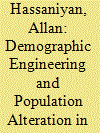

|
|
|
|
|
| Summary/Abstract |
Studying the Iranian Kurdish question reveals the importance of the geopolitical location of the Kurdish region, which has left a massive impact on the framework and capability of the contemporary Kurdish national movement. Aware of this fact, different ruling regimes of Iran, considering territorial threats associated with the Kurdish nationalistic movement, implemented different policies of systematic “demographic engineering,” aimed at reducing the capability of the Kurdish claim for autonomy. Some aspects of the policy of demographic engineering implemented during the Safavid and the Pahlavi dynasties have been examined. Based on this, the article argues that the geopolitical location of the Kurdish region, as a buffer zone between the Ottoman and Safavid dynasties, has diminished and continues to undermine the capability of the Kurdish struggle for autonomy in Iran.
|
|
|
|
|
|
|
|
|
|
|
|
|
|
|
|
| 13 |
ID:
169127
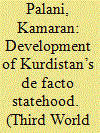

|
|
|
|
|
| Summary/Abstract |
This research aims to analyse the drivers which informed the decision and timing of Kurdistan’s independence referendum on 25 September 2017. Here we argue that any proper examination of these drivers must begin by investigating the relationship between the fight to counter the Islamic State begun in 2014, the disputes arising as a result of Kurdistan’s presidential election issue in 2015 and the internal political rivalry exacerbated by the question of whether to hold a referendum. The findings of this article highlight the centrality of de facto entities’ internal governance in their struggle towards statehood. The fight against IS served as a primary driver in influencing the timing and the approach of the September 2017 referendum. While the 2015 political deadlock resulting in the illegal extension of Barzani’s presidency was not a determining factor leading to the referendum, nonetheless it quickened the process and influenced the timing.
|
|
|
|
|
|
|
|
|
|
|
|
|
|
|
|
| 14 |
ID:
105671
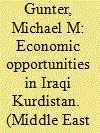

|
|
|
| 15 |
ID:
190678


|
|
|
|
|
| Summary/Abstract |
On 17 June 2017, Ali Khamenei, the supreme leader of the Islamic Republic of Iran, called on pro-regime vigilantes to ‘fire at will’ or to act on their own discretion in putting the state’s Islamic teaching into practice without the need to consult either their superiors or the relevant authorities. Our article argues that, since 1979, the policy of ‘firing at will’ has been the defining feature of the Islamic Republic’s model of governance and corresponds to the spirit of its constitution. Inspired by the scholarship on disciplinary policies, this article seeks to contextualize the ‘firing at will’ policy within the ethno-religious and racial discourse embodied in and warranted by the Islamic Republic’s constitution. Finally, by discussing the state’s violent treatment of Kurdish kolbers (cross-border laborers), we will show how the Iranian state’s internal colonial policies have engendered a state of exception and normalized the daily spectacle of violence in Eastern Kurdistan.
|
|
|
|
|
|
|
|
|
|
|
|
|
|
|
|
| 16 |
ID:
080098
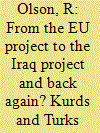

|
|
|
| 17 |
ID:
057921
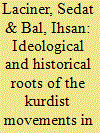

|
|
|
| 18 |
ID:
023135
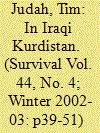

|
|
|
|
|
| Publication |
2002.
|
| Description |
p39-51
|
| Summary/Abstract |
The Kurdish autonomous region in northern Iraq, created in the wake of the Gulf War in 1991, is abuzz with a sense of foreboding and excitement. There is fear that Saddam Hussein may take his revenge on the Kurds for any US-led attack, and that the Turks could intervene. The Turks fear that any post-war Iraqi Kurdish federal unit will be a stepping stone to eventual independence. Although Kurdish politicians will not say so publicly, they certainly hope that this indeed will be the case. The two main parties have put aside their differences and reconvened the Kurdish parliament. There are also plans to drive out an Islamic fundamentalist group holed up in the mountains, allegedly supported by Iran, Iraq and al-Qaeda. The Kurds may do well out of any US-led offensive on Iraq. If the future Iraq is federal and democratic, the Kurds will have a powerful voice in Baghdad and control of their own affairs – and future generations will be far better placed to achieve the long-term aim of secession and independence.
|
|
|
|
|
|
|
|
|
|
|
|
|
|
|
|
| 19 |
ID:
062567
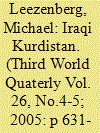

|
|
|
| 20 |
ID:
171874
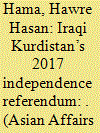

|
|
|
|
|
| Summary/Abstract |
On 7 June 2017, the former Kurdistan president Massoud Barzani called a meeting between 15 Kurdish political parties to seek their approval for a referendum on Iraqi Kurdish independence. Despite many adverse circumstances – the proroguing of the Kurdistan parliament, the strained relations among the Kurdish political parties, and the general political stalemate in Iraqi Kurdistan – the meeting agreed that a referendum should take place on 25 September 2017. However, both the Gorran Movement (Gorran) and the Kurdistan Islamic Group (Komal) refused to take part in the meeting and instead requested that the government's main focus be on restoring the political environment and restarting the Kurdistan parliament before any discussions take place on the issue of a Kurdish referendum. Notwithstanding internal, regional and international pressures, the Kurdistan Regional Government pressed ahead and held its referendum on 25 September 2017. The central question that remains about the Kurdistan referendum is what really motivated Kurdish politicians, in particular those of the Kurdistan Democratic Party (KDP) to hold the poll? This article argues that the KDP has a number of different public and private motivations in holding the independence referendum, which need to be explored.
|
|
|
|
|
|
|
|
|
|
|
|
|
|
|
|